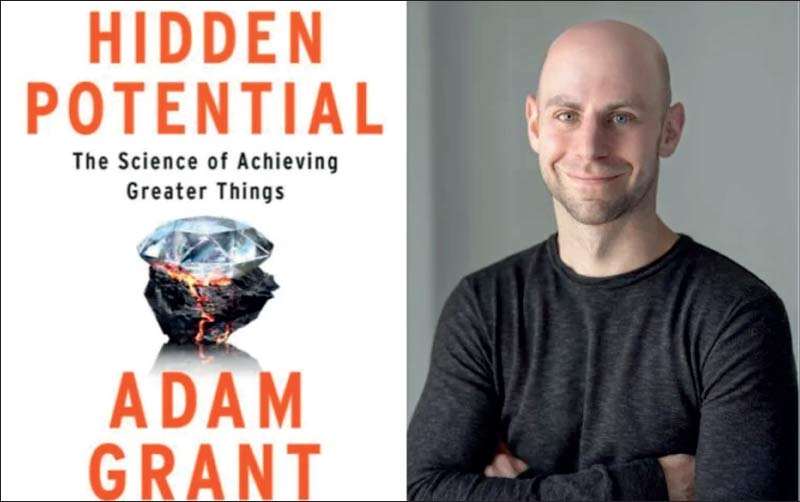Friday Feb 13, 2026
Friday Feb 13, 2026
Monday, 8 July 2024 00:59 - - {{hitsCtrl.values.hits}}

 It was one of my “learning partners” who gave me a gift after his successful completion of the MBA at the Postgraduate Institute of Management (PIM). That is how I came across the “Hidden Potential,” a best-selling book by one of my favourite management authors, Prof. Adam Grant. It resonates well with the solutions we seek to untap the potential of Sri Lankan student community through proposed education reforms. Today’s column reflects on the essence of “Hidden Potential.”
It was one of my “learning partners” who gave me a gift after his successful completion of the MBA at the Postgraduate Institute of Management (PIM). That is how I came across the “Hidden Potential,” a best-selling book by one of my favourite management authors, Prof. Adam Grant. It resonates well with the solutions we seek to untap the potential of Sri Lankan student community through proposed education reforms. Today’s column reflects on the essence of “Hidden Potential.”
Overview
The term potential essentially refers to the capabilities or capacities that are yet to be discovered and developed. It also means the latent qualities that can be utilised for future success. The challenge is tapping the potential or unleashing of it. This is where Adam Grant becomes versatile. The book illuminates how we can elevate ourselves and others to unexpected heights through practically possible means.
“We live in a world that’s obsessed with talent,” says Adam. “We celebrate gifted students in school, natural athletes in sports, and child prodigies in music. But admiring people who start out with innate advantages leads us to overlook the distance we ourselves can travel. We underestimate the range of skills that we can learn and how good we can become. We can all improve at improving. And when opportunity does not knock, there are ways to build a door.”
Highlights of “Hidden Potential”
The way Adam presents, the Hidden Potential offers a new framework for raising aspirations and exceeding expectations. He weaves together groundbreaking evidence, surprising insights, and vivid storytelling that takes us from the classroom to the boardroom, the playground to the Olympics, and underground to outer space. According to him, progress depends less on how hard you work than how well you learn. Growth is not about the genius you possess but about the character you develop. Grant shows us how to build the character skills and motivational structures to realise our own potential, and how to design systems that create opportunities for those who have been underrated and overlooked.
There is a distinct difference in Adam’s approach. Whilst many authors have chronicled the habits of superstars who accomplish great things, he reveals how anyone can rise to achieve greater things. As he states, “the true measure of your potential is not the height of the peak you’ve reached, but how far you’ve climbed to get there.”
Using his own pioneering research as Wharton’s youngest tenured professor, Adam Grant shows us the power of hidden potential as a way of achieving greater things. “When we admire great thinkers, doers and leaders, we often focus narrowly on their performance,” observes Adam. “That leads us to elevate people who have accomplished the most and overlook the once who have achieved the most with the least…” “After studying the character skills that unleash hidden potential, I’ve identified specific forms of proactivity, determination, and discipline that matter,” he further elaborates.
The way he refers to Helen Keller, the well-known blind author is indeed refreshing. “Character cannot be developed in each and quiet. Only through experiences of trial and suffering can the soul be strengthened, vision cleared, ambition inspired, and success achieved.”
In fact, procrastination is the enemy of untapping potential. “If we wait until we feel ready to take on a new challenge, we might never pursue it all,” says Grant. “There may not come a day when we wake up and suddenly feed prepared. We become prepared by taking the leap anyway.”
The way Serena Williams now retired professional Tennis star commented on Adam’s seminal work is interesting. “This brilliant book will shatter your assumptions about what it takes to improve and succeed. I wish I could go back in time and gift it to my younger self. It would have helped me find a more joyful path to progress.”
The book has three main parts, namely, skills of character, structures for motivation and systems of opportunity. Grant deploys his fabulous storytelling ability to share case studies of people breaking through their barriers to demonstrate their untapped potential, exceeding expectations.
Actions for Impact
The book, “Hidden Potential” contains golden guidelines to unlock hidden potential in order to achieve greater significance in life. Here are some of those:
1. When opportunity does not knock, look for ways to build a door or climb through a window.
2. Do not be afraid to try a new style
3. Seek discomfort to faster your growth
4. Increase your absorptive capacity
5. Ask for advice, not feedback: “What’s one thing I can do better next time?”
6. Strive for excellence, not perfection
7. Look outward for the right support at the right time
8. Compete against yourself: Measure your progress over time, and not against an opponent.
9. Be proactive about rest and recovery: Do not wait until you are burned out or bored
10. Build confidence by coaching others
“When we evaluate people, there is nothing more rewarding than finding a diamond in the rough,” observes Adam. “Our job is not to apply the pressure that brings out their brilliance. It is to make sure we do not overlook who have already faced that pressure and recognise their potential to shine.”
Adam has specific suggestions to bring the best in students.
Adam suggests us to redefine success. “The most meaningful form of performance is progress. The ultimate mark of potential is not the height of the peak you have reached, but the distance you have travelled, and helped others to travel.”
Adam Grant as an Advancing Star
I met Prof. Adam Grant once at the Annual Conference of the Chartered Institute of Personnel and Development (CIPD), held in Manchester, UK. He appeared to be humble and humane, which is reflective of his overarching approach in all his writings.
Adam Grant is a man who has earned many accolades. He is Wharton’s youngest tenured professor and a top-rated teacher. He has been recognised as one of HR’s most influential international thinkers, BusinessWeek’s favourite professors, the world’s 40 best business professors under 40, and Malcolm Gladwell’s favourite social science writers. Previously, he was a record-setting advertising director at Let Us Go Publications, an All-American springboard diver, and a professional magician.
Adam is currently the number one New York Times bestselling author of books that have sold millions of copies and been translated into 35 languages. He has been profiled on the Today Show and in the New York Times magazine cover story, “Is giving the secret to getting ahead?” Adam’s speaking and consulting clients include Google, Facebook, Johnson & Johnson, the United Nations, the World Economic Forum, and the US Army and Navy. He got his permanency as an academic while still in his twenties and has been honoured with the Excellence in Teaching Award for every class that he has taught.
Adam earned his Ph.D. in organisational psychology from the University of Michigan, completing it in less than three years, and his B.A. from Harvard University, magna cum laude with highest honours and Phi Beta Kappa honours. He has more than 60 publications in leading management and psychology journals, and his pioneering studies have increased performance and reduced burnout among engineers and sales professionals, enhanced call centre productivity, and motivated safety behaviours among doctors, nurses, and lifeguards.
Reflecting on Sri Lankans
Having read the book and listened to its author, I started thinking on us, Sri Lankans. Are we unleashing our hidden potential enough? Are we guiding our children in tapping their hidden potential? Are there techniques familiar to us in order to deploy in discovering the hidden potential? My common answer to all the above three questions is “grossly inadequate.”
At times, we tend to get into a comfort zone of complacency, which hampers our growth. What Adam observed is much relevant here. We tend to be more talkers than workers, in criticising others evil than correcting ourselves. The mainstream media can play a major role here in showcasing positive and productive people who have unleased their potential wisely.
It all beings with the right mindset. The genuine desire to learn in becoming a “life-long learner” is a sensible approach. The education system Willingness to learn is more important than work ethic. As John Dewey said, “education is not preparation for life; education is life itself.”
It was encouraging to see the adoption of six guidelines by the ministry of education in the current initiative. In brief, they refer to outcomes-driven, strengthening capacity at delivery points, stakeholder understanding and engagement, inevitable technology trends, constraints of financial & other resources and being pragmatic. The proposed reforms, if implemented well with all needed support, hopefully will cover general education, higher education, technical and vocational education, education administration, and institutions building for human resource training and development in the sector.
Way forward
Adam has mentioned a beautiful poem by Langston Huges, in his epilogue.
“Hold fast to dreams
For if dreams die
Life is a broken-winged bird
That cannot fly.”
We need to be dreamers and deliverers. It needs determination, discipline, and devotion to untapping the hidden potential for the betterment of humanity. What Adam Grant presented is a clarion call for all of us to make our lives truly, engaging, enhancing, and enriching. We Sri Lankans can do a lot more in this respect.
(The writer, a Senior Professor in Management, and an Independent Non-executive Director, can be reached at [email protected], [email protected] or www.ajanthadharmasiri.info.)